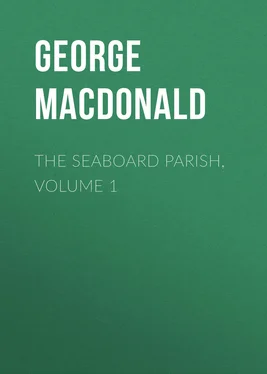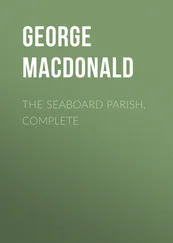George MacDonald - The Seaboard Parish, Volume 1
Здесь есть возможность читать онлайн «George MacDonald - The Seaboard Parish, Volume 1» — ознакомительный отрывок электронной книги совершенно бесплатно, а после прочтения отрывка купить полную версию. В некоторых случаях можно слушать аудио, скачать через торрент в формате fb2 и присутствует краткое содержание. Жанр: foreign_prose, foreign_religion, foreign_antique, на английском языке. Описание произведения, (предисловие) а так же отзывы посетителей доступны на портале библиотеки ЛибКат.
- Название:The Seaboard Parish, Volume 1
- Автор:
- Жанр:
- Год:неизвестен
- ISBN:нет данных
- Рейтинг книги:3 / 5. Голосов: 1
-
Избранное:Добавить в избранное
- Отзывы:
-
Ваша оценка:
- 60
- 1
- 2
- 3
- 4
- 5
The Seaboard Parish, Volume 1: краткое содержание, описание и аннотация
Предлагаем к чтению аннотацию, описание, краткое содержание или предисловие (зависит от того, что написал сам автор книги «The Seaboard Parish, Volume 1»). Если вы не нашли необходимую информацию о книге — напишите в комментариях, мы постараемся отыскать её.
The Seaboard Parish, Volume 1 — читать онлайн ознакомительный отрывок
Ниже представлен текст книги, разбитый по страницам. Система сохранения места последней прочитанной страницы, позволяет с удобством читать онлайн бесплатно книгу «The Seaboard Parish, Volume 1», без необходимости каждый раз заново искать на чём Вы остановились. Поставьте закладку, и сможете в любой момент перейти на страницу, на которой закончили чтение.
Интервал:
Закладка:
"Papa, papa! do forgive me. This is a judgment on me for talking to you as I did that dreadful morning. But I was so happy that I was impertinent."
"You silly darling!" I said. "A judgment! God be angry with you for that! Even if it had been anything wrong, which it was not, do you think God has no patience? No, Connie. I will tell you what seems to me much more likely. You wanted something to do; and so God gave you something to do."
"Lying in bed and doing nothing!"
"Yes. Just lying in bed, and doing his will."
"If I could but feel that I was doing his will!"
"When you do it, then you will feel you are doing it."
"I know you are coming to something, papa. Please make haste, for my back is getting so bad."
"I've tired you, my pet. It was very thoughtless of me. I will tell you the rest another time," I said, rising.
"No, no. It will make me much worse not to hear it all now."
"Well, I will tell you. Be still, my darling, I won't be long. In the time of the old sacrifices, when God so kindly told his ignorant children to do something for him in that way, poor people were told to bring, not a bullock or a sheep, for that was more than they could get, but a pair of turtledoves, or two young pigeons. But now, as Crashaw the poet says, 'Ourselves become our own best sacrifice.' God wanted to teach people to offer themselves. Now, you are poor, my pet, and you cannot offer yourself in great things done for your fellow-men, which was the way Jesus did. But you must remember that the two young pigeons of the poor were just as acceptable to God as the fat bullock of the rich. Therefore you must say to God something like this:—'O heavenly Father, I have nothing to offer thee but my patience. I will bear thy will, and so offer my will a burnt-offering unto thee. I will be as useless as thou pleasest.' Depend upon it, my darling, in the midst of all the science about the world and its ways, and all the ignorance of God and his greatness, the man or woman who can thus say, Thy will be done , with the true heart of giving up is nearer the secret of things than the geologist and theologian. And now, my darling, be quiet in God's name."
She held up her mouth to kiss me, but did not speak, and I left her, and sent Dora to sit with her.
In the evening, when I went into her room again, having been out in my parish all the morning, I began to unload my budget of small events. Indeed, we all came in like pelicans with stuffed pouches to empty them in her room, as if she had been the only young one we had, and we must cram her with news. Or, rather, she was like the queen of the commonwealth sending out her messages into all parts, and receiving messages in return. I might call her the brain of the house; but I have used similes enough for a while.
After I had done talking, she said—
"And you have been to the school too, papa?"
"Yes. I go to the school almost every day. I fancy in such a school as ours the young people get more good than they do in church. You know I had made a great change in the Sunday-school just before you came home."
"I heard of that, papa. You won't let any of the little ones go to school on the Sunday."
"No. It is too much for them. And having made this change, I feel the necessity of being in the school myself nearly every day, that I may do something direct for the little ones."
"And you'll have to take me up soon, as you promised, you know, papa—just before Sprite threw me."
"As soon as you like, my dear, after you are able to read again."
"O, you must begin before that, please.—You could spare time to read a little to me, couldn't you?" she said doubtfully, as if she feared she was asking too much.
"Certainly, my dear; and I will begin to think about it at once."
It was in part the result of this wish of my child's that it became the custom to gather in her room on Sunday evenings. She was quite unable for any kind of work such as she would have had me commence with her, but I used to take something to read to her every now and then, and always after our early tea on Sundays.
What a thing it is to have one to speak and think about and try to find out and understand, who is always and altogether and perfectly good! Such a centre that is for all our thoughts and words and actions and imaginations! It is indeed blessed to be human beings with Jesus Christ for the centre of humanity.
In the papers wherein I am about to record the chief events of the following years of my life, I shall give a short account of what passed at some of these assemblies in my child's room, in the hope that it may give my friends something, if not new, yet fresh to think about. For God has so made us that everyone who thinks at all thinks in a way that must be more or less fresh to everyone else who thinks, if he only have the gift of setting forth his thoughts so that we can see what they are.
I hope my readers will not be alarmed at this, and suppose that I am about to inflict long sermons upon them. I am not. I do hope, as I say, to teach them something; but those whom I succeed in so teaching will share in the delight it will give me to write about what I love most.
As far as I can remember, I will tell how this Sunday-evening class began. I was sitting by Constance's bed. The fire was burning brightly, and the twilight had deepened so nearly into night that it was reflected back from the window, for the curtains had not yet been drawn. There was no light in the room but that of the fire.
Now Constance was in the way of asking often what kind of day or night it was, for there never was a girl more a child of nature than she. Her heart seemed to respond at once to any and every mood of the world around her. To her the condition of air, earth, and sky was news, and news of poetic interest too. "What is it like?" she would often say, without any more definite shaping of the question. This same evening she said:
"What is it like, papa?"
"It is growing dark," I answered, "as you can see. It is a still evening, and what they call a black frost. The trees are standing as still as if they were carved out of stone, and would snap off everywhere if the wind were to blow. The ground is dark, and as hard as if it were of cast iron. A gloomy night rather, my dear. It looks as if there were something upon its mind that made it sullenly thoughtful; but the stars are coming out one after another overhead, and the sky will be all awake soon. A strange thing the life that goes on all night, is it not? The life of owlets, and mice, and beasts of prey, and bats, and stars," I said, with no very categorical arrangement, "and dreams, and flowers that don't go to sleep like the rest, but send out their scent all night long. Only those are gone now. There are no scents abroad, not even of the earth in such a frost as this."
"Don't you think it looks sometimes, papa, as if God turned his back on the world, or went farther away from it for a while?"
"Tell me a little more what you mean, Connie."
"Well, this night now, this dark, frozen, lifeless night, which you have been describing to me, isn't like God at all—is it?"
"No, it is not. I see what you mean now."
"It is just as if he had gone away and said, 'Now you shall see what you can do without me.'
"Something like that. But do you know that English people—at least I think so—enjoy the changeful weather of their country much more upon the whole than those who have fine weather constantly? You see it is not enough to satisfy God's goodness that he should give us all things richly to enjoy, but he must make us able to enjoy them as richly as he gives them. He has to consider not only the gift, but the receiver of the gift. He has to make us able to take the gift and make it our own, as well as to give us the gift. In fact, it is not real giving, with the full, that is, the divine, meaning of giving, without it. He has to give us to the gift as well as give the gift to us. Now for this, a break, an interruption is good, is invaluable, for then we begin to think about the thing, and do something in the matter ourselves. The wonder of God's teaching is that, in great part, he makes us not merely learn, but teach ourselves, and that is far grander than if he only made our minds as he makes our bodies."
Читать дальшеИнтервал:
Закладка:
Похожие книги на «The Seaboard Parish, Volume 1»
Представляем Вашему вниманию похожие книги на «The Seaboard Parish, Volume 1» списком для выбора. Мы отобрали схожую по названию и смыслу литературу в надежде предоставить читателям больше вариантов отыскать новые, интересные, ещё непрочитанные произведения.
Обсуждение, отзывы о книге «The Seaboard Parish, Volume 1» и просто собственные мнения читателей. Оставьте ваши комментарии, напишите, что Вы думаете о произведении, его смысле или главных героях. Укажите что конкретно понравилось, а что нет, и почему Вы так считаете.












